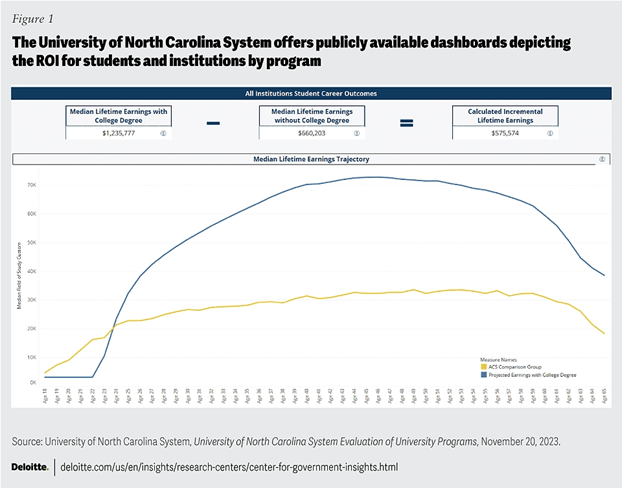The Returns to Education | (News and Research 382)
Study of 5.8 Million Americans Finds that a College Degree Yields a Significant Return on Investment | A college education is expected to yield an annual rate of 9 to 10 percent throughout an individual’s career. A new analysis finds that earning a college degree is still a sound investment, although the rate of economic return varies across college majors and student demographics. The findings come as skepticism continues to grow over the value of a degree in the face of rising college costs, a decline in college enrollment, and a transforming economy.

If You Didn’t Get Into [Insert Name of Ivy League College], a Public School Is the Better Investment (Bloomberg) | Many elite private colleges underperform when it comes to the average student’s return, an analysis shows. Almost everyone wants to go to an Ivy League school. But if you don’t get in — and most don’t — your next best option isn’t necessarily the most prestigious college that accepted you.
2024 Higher Education Trends | Deloitte | Some states now require state institutions to demonstrate that their programs have a positive return on investment (ROI). The North Carolina General Assembly recently required the University of North Carolina System to study the ROI of its educational offerings to its graduates. This study found that 94% of the system’s undergraduate and 91% of its graduate programs resulted in a positive return on student investment. Publicly available dashboards offered by the system show the ROI for students and institutions by program.

Updates on private returns to education in Uganda: evidence from universal primary education policy | Sakaue, Wokadala, Ogawa | This study updates private returns to education in Uganda using consumption measures as an outcome variable, focusing on obtaining estimates using instrumental variables based on the introduction of the universal primary education policy. Unlike common findings from developed countries, the evidence from this study for a low-income country suggests that returns to education are smaller for liquidity-constrained individuals than for average individuals. The finding also suggests that smaller returns are observed for self-employed farmers than self-employed workers in non-agricultural sectors. The trend, showing smaller returns for liquidity-constrained individuals, is particularly obvious among self-employed farmers.
Estimating Returns to Education: Back to the Short-Cut | Estimates of the rate of return to investment in education have been the subject of an explosive literature in recent years papers. Most estimates come from the Mincerian earnings function. A less well-known method – the short-cut – offers an efficient means of quickly estimating returns with limited data. It has the added benefit of allowing for easy incorporation of public costs of schooling. Only needing grouped earnings by level of education the short-cut method the method is becoming popular again, especially in cases where lack detailed data, especially in developing countries.
A study on regional return to education in South Korea: comparison of male and female wages | Lee, Choi | This study examines the return to education in South Korea by comparing metropolitan areas with non-metropolitan areas. It utilizes the Korean Labor and Income Panel Study from 2018 and 2019 for analysis, alongside the Mincer equation. The findings indicate that female workers have a higher return to education compared to male workers. The Oaxaca decomposition method reveals that private academies contribute to increasing differential treatment between men and women, whereas public education reduces the gap. Additionally, the regression discontinuity design method shows that the university premium is significantly different by region.
The effect of education on household incomes using the Mincerian approach: a comparison between MENA and the rest of the world | Tzannatos, Diwan, Ahad | This paper uses the Mincerian approach in an experimental way to examine the impact of education on household incomes (not labor earnings) of all workers (not just employees) across 162 countries. The results are broadly similar to the conventionally estimated rates of return to education after allowing for the fact that earnings are only a part of total household incomes. When applying the results to the case of Arab countries, it is found find that this experimental approach can promisingly be used for the study of the impact of education not just on individual earnings of employees but also on total household incomes of all workers and more broadly on the economy and the labor market.
RR on Education in Greece: Public vs Private Economic Sector, 1977-2022 | Magoula | The aim of this article is to examine the rates of return to education in the public and private sectors in Greece during the period 1977-2022. Overtime, rates of return on education in the public sector in Greece are lower than their counterparts in the private sector. The contribution to literature is in estimating the economic returns to education, as decision makers should incorporate them into the planning policy for enhancing the public sector in Greece.
The Effects of Schooling on Cognitive Skills: Evidence from Education Reforms | Cappellari, Checchi, Ovidi | Novel evidence is provided on the causal effects of schooling on cognitive skills throughout adulthood. Exogenous variation in schooling induced by institutional reforms targeted at increasing education quantity is used. An additional year of schooling increases internationally comparable numeracy and literacy scores across 21 countries and the entire distribution of working age. The effect is non-linear: college and high school degrees have disproportional impacts, and reforms targeting early and late school years generate larger skill gains. Exploiting unique data on the use of skills, we argue that experience in skill-intensive jobs magnifies the impact of schooling on skills. Larger cognitive skill returns to schooling for relatively advantaged individuals and older at the time of skill measurement are in line with this interpretation.
From the IMF: Sub-Saharan Africa’s Growth Requires Quality Education for Growing Population | Despite government budget strains, countries should prioritize investment in schools with the help of the international community.
New Developments in the Economics of Education | Exciting opportunity to present your research on the economics of education at the Public Sector Economics 2024 Conference September 23, 2024, in Zagreb, Croatia. Submit proposals by May 15 here. Keynote speakers: Daniele Checchi, University of Milan, Italy and Harry Anthony Patrinos, World Bank.
